As April quickly comes to an end, I realize I never posted anything about this being National Poetry Month. For some of you…you could really care less. Poetry may not be your thing, and I can appreciate that. But for me, it’s an integral part of my life. Though I don’t “blatantly” talk about it [poetry] on KO, I’m sure most of you have noticed by now that I open the majority of my reviews with quotes. 90% of the time these are quotes I found in anthologies of poetry. (Which is..coincidently, the ONLY thing I still check out at my local library. There is just something about dust and poetry that goes together.) I use them because they have a tendency to mean several things at once, or at the very least have an eloquent way of expressing something that I find too difficult. They are a fall back for me. They are also a comfort.
Anyways, to commemorate the month I thought I would share with you my 5 favorite poetry anthologies. As well as introduce you to my favorite poet. Mr. John Keats, and his poem “A Thing of Beauty” which happens to grace page 1 of my little black book.
5 Books Every Poetry Lover Should Own
Leaves of Grass by Walt Whitman
Walt Whitman was born on May 31, 1819, near Huntington, Long Island, New York. On July 4, 1855, the first edition of Leaves of Grass, the volume of poems that for the next four decades would become his lifes work, was placed on sale. Although some critics treated the volume as a joke and others were outraged by its unprecedented mixture of mysticism and earthiness, the book attracted the attention of some of the finest literary intelligences. His poetry slowly achieved a wide readership in America and in England, where he was praised by Swinburne and Tennyson. (D. H. Lawrence later referred to Whitman as the”greatest modern poet, and”the greatest of Americans. Whitman suffered a stroke in 1873 and was forced to retire to Camden, New Jersey, where he would spend the last twenty years of his life. There he continued to write poetry, and in 1881 the seventh edition of Leaves of Grass was published to generally favorable reviews. However, the book was soon banned in Boston on the grounds that it was obscene literature. In January 1892 the final edition of Leaves of Grass appeared on sale, and Whitman’s life work was complete. He died two months later on the evening of March 26, 1892, and was buried four days afterward at Harleigh Cemetery in Camden. Give Me The Splendid Silent Sun GIVE me the splendid silent sun, with all his beams full-dazzling; The book was compiled from Thomas H. Johnson’s hard-to-find variorum from 1955. While some explanatory notes would have been helpful, it’s a prodigious collection, showcasing Dickinson’s intractable obsession with nature, including death. Poem 1732, which alludes to the deaths of her father and a onetime suitor, illustrates her talent: 1732 My life closed twice before its close; So huge, so hopeless to conceive The musicality of her punctuation and the outright elegance of her style–akin to Christina Rossetti‘s hymns, although not nearly so religious–rescue the poems from their occasional abstruseness. The Complete Poems is especially refreshing because Dickinson didn’t write for publication; only 11 of her verses appeared in magazines during her lifetime, and she had long-resigned herself to anonymity, or a “Barefoot-Rank,” as she phrased it. This is the perfect volume for readers wishing to explore the works of one of America’s first poets. Robert Lee Frost was an American poet. He is highly regarded for his realistic depictions of rural life and his command of American colloquial speech. His work frequently employed settings from rural life in New England in the early twentieth century, using them to examine complex social and philosophical themes. A popular and often-quoted poet, Frost was honored frequently during his lifetime, receiving four Pulitzer Prizes for Poetry. A Patch of Old Snow There’s a patch of old snow in a corner It is speckled with grime as if Napoleon Bonaparte November 21, 1796 I am going to bed with my heart full of your adorable image… I cannot wait to give you proofs of my ardent love… How happy I would be if I could assist you at your undressing, the little firm white breast, the adorable face, the hair tied up in a scarf a la creole. You know that I will never forget the little visits, you know, the little black forest… I kiss it a thousand times and wait impatiently for the moment I will be in it. To live within Josephine is to live in the Elysian fields. Kisses on your mouth, your eyes, your breast, everywhere, everywhere. The final work from one of our finest poets, The Wind Blows Through the Doors of My Heart is a uniquely intimate collection, a sustaining pleasure that will stand to remind us of Digges’s gift in decades to come. In his own lifetime John Keats would not have been associated with other major Romantic poets, and he himself was often uneasy among them. Outside his friendLeigh Hunt‘s circle of liberal intellectuals, the generally conservative reviewers of the day attacked his work, with malicious zeal, as mawkish and bad-mannered, as the work of an upstart “vulgar Cockney poetaster” (John Gibson Lockhart), and as consisting of “the most incongruous ideas in the most uncouth language” (John Wilson Croker). Although Keats had a liberal education in the boy’s academy at Enfield and trained at Guy’s Hospital to become a surgeon, he had no formal literary education. Yet Keats today is seen as one of the canniest readers, interpreters, questioners, of the “modern” poetic project-which he saw as beginning with William Wordsworth—to create poetry in a world devoid of mythic grandeur, poetry that sought its wonder in the desires and sufferings of the human heart. Beyond his precise sense of the difficulties presented him in his own literary-historical moment, he developed with unparalleled rapidity, in a relative handful of extraordinary poems, a rich, powerful, and exactly controlled poetic style that ranks Keats, with theWilliam Shakespeare of the sonnets, as one of the greatest lyric poets in English. (Continue Reading…) – The Poetry Foundation. A thing of beauty is a joy for ever: Watch this and understand why I fell in love.
Give me juicy autumnal fruit, ripe and red from the orchard;
Give me a field where the unmow’d grass grows;
Give me an arbor, give me the trellis’d grape;
Give me fresh corn and wheat–give me serene-moving animals, teaching content;
Give me nights perfectly quiet, as on high plateaus west of the Mississippi, and I looking up at the stars;
Give me odorous at sunrise a garden of beautiful flowers, where I can walk undisturb’d;
Give me for marriage a sweet-breath’d woman, of whom I should never tire; (Click to continue reading…) The Complete Poems of Emily Dickinson
It yet remains to see
If Immortality unveil
A third event to me,
As these that twice befell.
Parting is all we know of heaven,
And all we need of hell.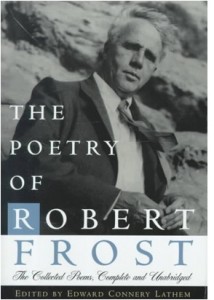
The Poetry of Robert Frost
That I should have guessed
Was a blow-away paper the rain
Had brought to rest.
Small print overspread it,
The news of a day I’ve forgotten —
If I ever read it.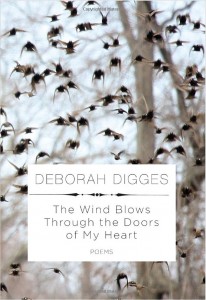
The Wind Blows Through The Doors of My Heart
When Deborah Digges died in the spring of 2009, at the age of fifty-nine, she left this gathering of poems that returns to and expands the creative terrain we recognize as hers. Here are poems that bring to life her rural Missouri childhood in a family with ten children (“Oh what a wedding train / of vagabonds we were who fell asleep just where we lay”); the love between men and women as well as the devastation of widowhood (“love’s house she goes dancing her grief-stricken dance / for his unpacked suitcases, . . . / . . . / his closets of clothes where I crouch like a thief”); and the moods of nature, which schooled her (“A tree will take you in, flush riot of needles light burst, the white pine / grown through sycamore”). Throughout, touching all subjects, either implicitly or explicitly, is the call to poetry itself.
My Favorite Poet?
John Keats
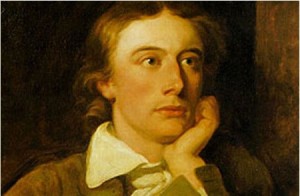 John Keats, who died at the age of twenty-five, had perhaps the most remarkable career of any English poet. He published only fifty-four poems, in three slim volumes and a few magazines. But at each point in his development he took on the challenges of a wide range of poetic forms from the sonnet, to the Spenserian romance, to the Miltonic epic, defining anew their possibilities with his own distinctive fusion of earnest energy, control of conflicting perspectives and forces, poetic self-consciousness, and, occasionally, dry ironic wit. In the case of the English ode he brought its form, in the five great odes of 1819, to its most perfect definition.
John Keats, who died at the age of twenty-five, had perhaps the most remarkable career of any English poet. He published only fifty-four poems, in three slim volumes and a few magazines. But at each point in his development he took on the challenges of a wide range of poetic forms from the sonnet, to the Spenserian romance, to the Miltonic epic, defining anew their possibilities with his own distinctive fusion of earnest energy, control of conflicting perspectives and forces, poetic self-consciousness, and, occasionally, dry ironic wit. In the case of the English ode he brought its form, in the five great odes of 1819, to its most perfect definition.A Thing of Beauty
Its lovliness increases; it will never
Pass into nothingness; but still will keep
A bower quiet for us, and a sleep
Full of sweet dreams, and health, and quiet breathing.
Therefore, on every morrow, are we wreathing
A flowery band to bind us to the earth,
Spite of despondence, of the inhuman dearth
Of noble natures, of the gloomy days,
Of all the unhealthy and o’er-darkn’d ways
Made for our searching: yes, in spite of all,
Some shape of beauty moves away the pall
From our dark spirits. Such the sun, the moon,
Trees old and young, sprouting a shady boon
For simple sheep; and such are daffodils
With the green world they live in; and clear rills
That for themselves a cooling covert make
‘Gainst the hot season; the mid-forest brake,
Rich with a sprinkling of fair musk-rose blooms:
And such too is the grandeur of the dooms
We have imagined for the mighty dead;
An endless fountain of immortal drink,
Pouring unto us from the heaven’s brink.


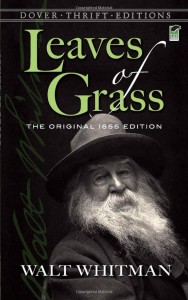
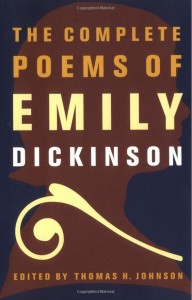
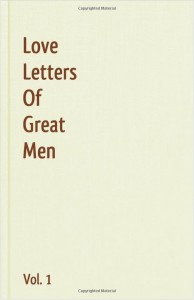





Mary Oliver!!!
The Journey
One day you finally knew
what you had to do, and began,
though the voices around you
kept shouting
their bad advice–
though the whole house
began to tremble
and you felt the old tug
at your ankles.
“Mend my life!”
each voice cried.
But you didn’t stop.
You knew what you had to do,
though the wind pried
with its stiff fingers
at the very foundations,
though their melancholy
was terrible.
It was already late
enough, and a wild night,
and the road full of fallen
branches and stones.
But little by little,
as you left their voices behind,
the stars began to burn
through the sheets of clouds,
and there was a new voice
which you slowly
recognized as your own,
that kept you company
as you strode deeper and deeper
into the world,
determined to do
the only thing you could do–
determined to save
the only life you could save.
Mary Oliver
That’s BEAUTIFUL!!! And very…empowering. Adding it to my book. Thanks for sharing. 🙂